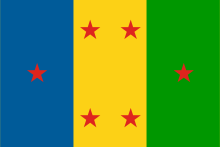- Ogoni people
-
Ogoni 
Ogoni Flag created by Ken Saro-Wiwa
Total population 500,000 (1963)[1] Regions with significant populations Nigeria Languages Religion traditional beliefs, Christianity
Related ethnic groups Ogoni people are one of the many indigenous peoples in the region of southeast Nigeria. They share common oil related environmental problem with the Ijaw people of Niger Delta, but Ogonis are not listed in the list of people historically belonging to Niger Delta. They number about one point five million people and live in a 404-square-mile (1,050 km2) homeland which they also refer to as Ogoni, or Ogoniland.
The Ogoni rose to international attention after a massive public protest campaign against Shell Oil, led by the Movement for the Survival of the Ogoni People (MOSOP).
Contents
Geography
The territory is located in Rivers State on the coast of the Gulf of Guinea, east of the city of Port Harcourt. It extends across the Local Government Areas (LGAs) Khana, Gokana, Tai, and Eleme. Traditionally, Ogoniland is divided into the six kingdoms of Babbe, Eleme, Gokana, Ken-Khana, Nyo-Khana, and Tai.
The Ogoni speak the related, mutually intelligible languages of Khana, Gokana, Tai (Tẹẹ), Eleme and Ban Ogoi[2] part of the linguistic diversity of the Niger Delta.
History
Like many peoples on the Guinea coast, the Ogoni have an internal political structure subject to community by community arrangement, including appointment of chiefs and community development bodies, some recognized by government and others not. They survived the period of the slave trade in relative isolation, and did not lose any of their members to enslavement. After Nigeria was colonized by the British in 1885, British soldiers arrived in Ogoni by 1901. Major resistance to their presence continued through 1914.
The Ogoni were integrated into a succession of economic systems at a pace that was extremely rapid and exacted a great toll from them. At the turn of the twentieth century, “the world to them did not extend beyond the next three or four villages,” but that soon changed. Ken Saro-Wiwa, the late president of MOSOP, described the transition this way: “if you then think that within the space of seventy years they were struck by the combined forces of modernity, colonialism, the money economy, indigenous colonialism and then the Nigerian Civil War, and that they had to adjust to these forces without adequate preparation or direction, you will appreciate the bafflement of the Ogoni people and the subsequent confusion engendered in the society.”[3]
Human Rights Violations
The Ogoni people have been victims of human right violations for many years. In 1993, following protests that were designed to stop contractors from laying a new pipeline for Shell, the Mobile Police Force men (MPF) raided the area to quell the unrest. In the chaos that followed, it has been alleged that 27 villages were raided, resulting in the death of 2,000 Ogoni people and displacement of 80,000.[4][5][6]
Notes
- ^ Sources vary widely about the population. Mushanga, p. 166, says "over 20 million"; Nzewi (quoted in Agawu), p. 31, says "about 15 million"; Okafor, p. 86, says "about twenty-five million"; Okpala, p. 21, says "around 30 million"; and Smith, p. 508, says "approximately 20 million".
- ^ Ethnologue Report for Ogoni
- ^ Quotes from Ken Saro-Wiwa, "Letter to Ogoni Youth."
- ^ David Kupfer, "Worldwide Shell boycott", The Progressive, 1996
- ^ PBS Documentary The New Americans: The Ogoni Refugees
- ^ Ken Saro-Wiwa, "Genocide in Nigeria: The Ogoni Tragedy"
References
- Brosnahan, L.F. 1967. A word list of the Gokana dialect of Ogoni. Journal of West African Languages, 143-52.
- Hyman, L.M. 1982. The representation of nasality in Gokana. In: The structure of phonological representations. ed. H. van der Hulst & Norval Smith. 111-130. Dordrecht: Foris.
- Hyman, L.M. 1983. Are there syllables in Gokana? In: Current issues in African linguistics, 2. Kaye et al. 171-179. Dordrecht: Foris.
- Ikoro, S.M. 1989. Segmental phonology and lexicon of Proto-Keggoid. University of Port Harcourt: M.A. thesis.
- Ikoro, S.M. 1996. The Kana language. Leiden: CNWS.
- Jeffreys, M.D.W. 1947. Ogoni Pottery. Man, 47: 81-83.
- Piagbo, B.S. 1981. A comparison of the sounds of English and Kana. B.A. project, University of Port Harcourt.
- Thomas, N.W. 1914. Specimens of languages from Southern Nigeria. London: Harrison & Sons.
- Vopnu, S.K. 1991. Phonological Processes and Syllable Structures in Gokana. M.A. Department of Linguistics and Nigerian Languages, University of Port Harcourt.
- Vọbnu, S.K. 2001. Origin and languages of Ogoni people. Boori, KHALGA: Ogoni Languages and Bible Center.
- Williamson, K. 1985. How to become a Kwa language. In Linguistics and Philosophy. Essays in Honor of Ruben S. Wells. eds. A. Makkai and A. Melby. Current Issues in Linguistic Theory, 42. Benjamins, Amsterdam.
- Wolff, H. 1959. Niger Delta languages I: classification. Anthropological Linguistics, 1(8):32-35.
- Wolff, H. 1964. Synopsis of the Ogoni languages. Journal of African languages, 3:38-51.
- Zua, B.A. 1987. The noun phrase in Gokana. B.A. project, University of Port Harcourt.
Ethnic groups in Nigeria Annang · Atyap · Aulliminden · Berom · Edo · Buduma · Defaka · Djerma · Ebira · Efik · Eket · Ekoi · Eleme · Esan · Etsakor · Fon · Fula · Goemai · Gwari · Hausa · Ibibio · Idoma · Igala · Igbo · Ijaw · Isoko · Itsekiri · Jukun · Kamuku · Kanuri · Kilba · Kirdi · Kofyar · Kuteb · Longuda · Mumuye · Nupe · Ogoni · Saro · Tarok · Tiv · Urhobo · Yoruba
Categories:- Ogoni people
- Ethnic groups in Nigeria
- Indigenous peoples of West Africa
Wikimedia Foundation. 2010.
